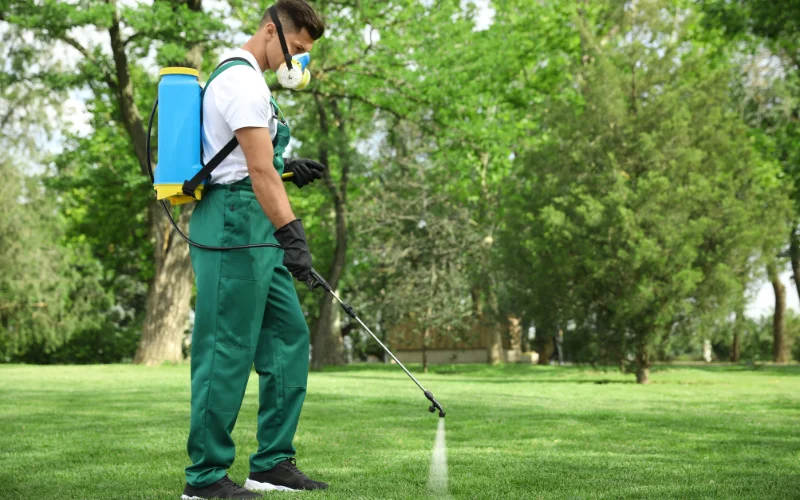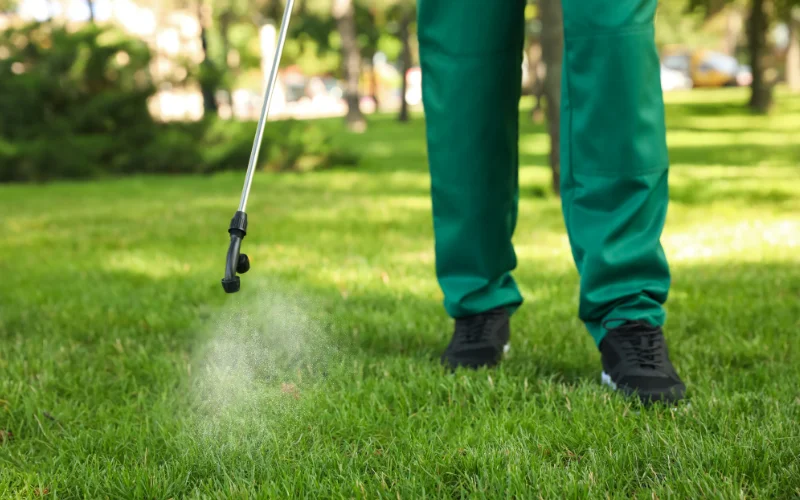Lawn pest management is essential for preserving the beauty and health of your outdoor space. A well-maintained lawn not only enhances your property’s curb appeal but also provides a safe environment for your family and pets. However, pests can threaten the health of your lawn, leading to damage and decreased enjoyment of your outdoor area.
Effective lawn pest management involves understanding the types of pests that can invade your yard and knowing how to control them. By using the right strategies, you can shield your lawn from pests while ensuring it remains lush and vibrant. This blog will explore the importance of lawn pest management, common pests you may encounter, and tips for preventing infestations.
Why Lawn Pest Management Is Important
Managing lawn pests is crucial for preserving the overall health of your yard and securing proper lawn care. Pests can weaken your grass, which causes it to become more susceptible to diseases, drought, and other environmental stressors. Additionally, a lawn infested with pests can quickly lose its appeal, making it less enjoyable for family gatherings and outdoor activities.
By implementing effective lawn pest management practices, you can protect your investment in your home and ensure a thriving landscape. This proactive approach not only keeps pests at
Common Lawn Pests and How to Manage Them
Understanding common lawn pests and implementing effective pest control strategies is essential for successful lawn pest management. Here are some pests that frequently invade lawns, along with recommended methods for managing them:
Grubs
These larvae of beetles feed on grass roots and can create brown patches in your lawn. To manage grubs, consider applying beneficial nematodes or insecticides specifically designed for grub control during the spring or late summer.
Chinch Bugs
These tiny insects suck sap from grass blades, which leads to yellowing and wilting. Effective pest management for chinch bugs includes maintaining proper watering practices and using insecticidal soap or granules when infestations occur.
Armyworms
These caterpillars can quickly damage your lawn. Regular inspections for signs of feeding can help you catch them early. Use insecticides or encourage natural predators, such as birds, to manage their populations effectively.
Fleahoppers
These small pests can damage turf grass by sucking sap. To control them, maintain healthy grass through proper watering and fertilization, and apply suitable insecticides when necessary.
Preventative Lawn Pest Management Tips

Preventative lawn pest management is essential for keeping your yard free of pests and ensuring its overall health. By taking proactive measures, you can minimize the risk of infestations and help your lawn stay vibrant and resilient. Here are some effective tips to help you prevent pest problems:
1. Maintain Healthy Grass
A strong, healthy lawn is less susceptible to pest infestations. Work with a professional lawn care service to establish a regular mowing schedule, proper watering techniques, and appropriate fertilization practices that promote vigorous grass growth.
2. Aerate Your Lawn
Aeration enhances soil health by allowing air, water, and nutrients to penetrate more effectively. Professional lawn care providers can perform aeration to strengthen root systems, making it harder for pests to take hold.
3. Rotate Your Plants
For flower beds or vegetable gardens, practice crop rotation. Consulting with a lawn expert can help you develop a rotation plan that disrupts pest life cycles and maintains soil health.
4. Encourage Beneficial Insects
Attract natural predators, like ladybugs, lacewings, and parasitic wasps, to your lawn. A lawn care service can provide guidance on how to create an inviting environment for these beneficial insects.
5. Conduct Regular Inspections
Regularly check your lawn for signs of pests or damage. Early catching problems allows you to take action quickly, which prevents infestations from spreading and becoming harder to control. This proactive approach helps keep your lawn healthy and minimizes the need for extensive treatments later.
Frequently Asked Questions
Yes, lawn pest control is worth it. It helps keep your lawn healthy and stops pests from causing damage to your grass. By using pest control, you can keep your yard looking green and nice, and it will be a better place for your family to enjoy. Professional lawn pest control also makes sure the right treatments are used to keep pests away for good.
Regular maintenance, including proper mowing, watering, and fertilization, helps keep your lawn healthy and less vulnerable to pests. Routine inspections and preventative treatments from a professional lawn care service can further reduce the chances of pests returning.
While chemical treatments can be effective, they aren’t always necessary. Many natural methods, including introducing beneficial insects and using organic products, can actually control pests. Consulting a lawn care expert can help determine the best approach for your lawn.
You should check your lawn for pests about once a week, especially during warmer months when pests are more active. Look for things like brown spots, wilting grass, or bugs. Finding pests early makes it easier to control them before they cause too much damage. If you’re unsure how to check, you can always ask a professional lawn care service to help.
Final Thoughts
Managing lawn pests effectively is crucial for maintaining a healthy and attractive yard. By recognizing the significance of pest management, knowing the common pests that can invade your space, and taking proactive measures, you can ensure your outdoor area remains vibrant and inviting.
If you’re looking for professional help with lawn care and pest management, don’t hesitate to contact Audet Enterprises. Let our experts give your lawn the exceptional care it needs to flourish! Your outdoor oasis is just a call away!
⬇️ Find us on Google Maps: Yard Cleanup Services in Portland, Maine ⬇️


